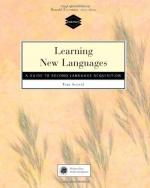|
This section contains 2,802 words (approx. 10 pages at 300 words per page) |

|
An understanding of language learning presupposes clarification of what knowledge of language consists of, what mechanisms are available for language learning, and what the course of language development is. There are two broad types of knowledge of language: grammatical knowledge, the nature of which is largely biologically determined; and experiential knowledge, which arises mostly from the learner's encounter with the world (O'Grady, Archibald, Aronoff, and Rees-Miller, 2001).
Grammatical knowledge bears on rule-governed phenomena susceptible of a precise formal description. A formal description of a language is called a grammar of the language. Typically, grammar consists of phonology (sound patterns), morphology (structure of words), syntax (structure of phrases and sentences), and semantics (meanings of words, phrases, and sentences). Experiential knowledge of language consists in part of the specific meanings and pronunciations of the individual words of a language. Such knowledge is more or less idiosyncratic; it...
|
This section contains 2,802 words (approx. 10 pages at 300 words per page) |

|


